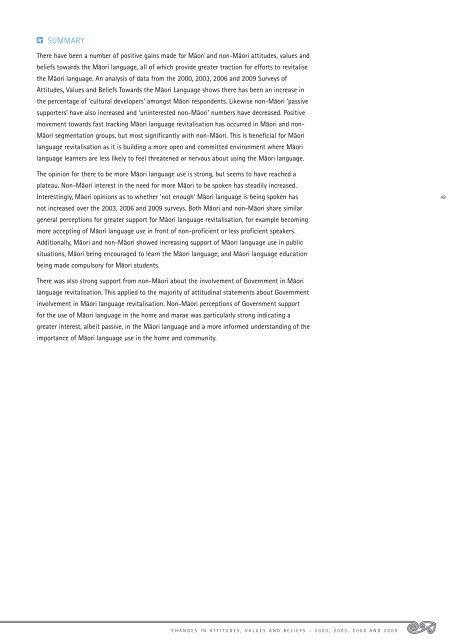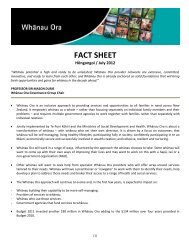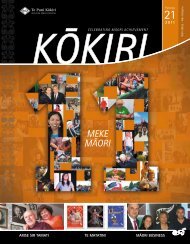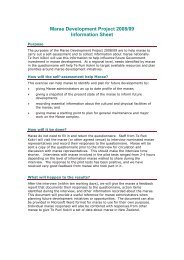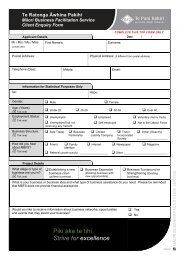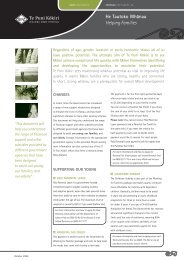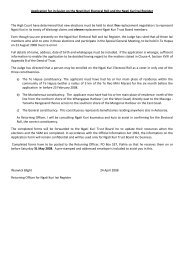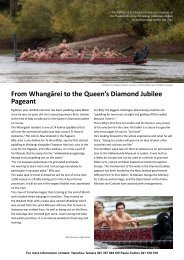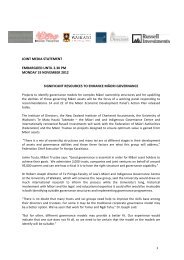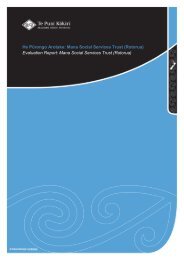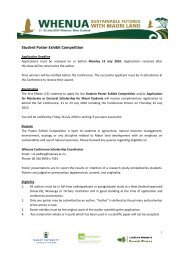2009 Survey of Attitudes, Values and Beliefs ... - Te Puni Kokiri
2009 Survey of Attitudes, Values and Beliefs ... - Te Puni Kokiri
2009 Survey of Attitudes, Values and Beliefs ... - Te Puni Kokiri
Create successful ePaper yourself
Turn your PDF publications into a flip-book with our unique Google optimized e-Paper software.
Summary<br />
There have been a number <strong>of</strong> positive gains made for Mäori <strong>and</strong> non-Mäori attitudes, values <strong>and</strong><br />
beliefs towards the Mäori language, all <strong>of</strong> which provide greater traction for efforts to revitalise<br />
the Mäori language. An analysis <strong>of</strong> data from the 2000, 2003, 2006 <strong>and</strong> <strong>2009</strong> <strong>Survey</strong>s <strong>of</strong><br />
<strong>Attitudes</strong>, <strong>Values</strong> <strong>and</strong> <strong>Beliefs</strong> Towards the Mäori Language shows there has been an increase in<br />
the percentage <strong>of</strong> ‘cultural developers’ amongst Mäori respondents. Likewise non-Mäori ‘passive<br />
supporters’ have also increased <strong>and</strong> ‘uninterested non-Mäori’ numbers have decreased. Positive<br />
movement towards fast tracking Mäori language revitalisation has occurred in Mäori <strong>and</strong> non-<br />
Mäori segmentation groups, but most significantly with non-Mäori. This is beneficial for Mäori<br />
language revitalisation as it is building a more open <strong>and</strong> committed environment where Mäori<br />
language learners are less likely to feel threatened or nervous about using the Mäori language.<br />
The opinion for there to be more Mäori language use is strong, but seems to have reached a<br />
plateau. Non-Mäori interest in the need for more Mäori to be spoken has steadily increased.<br />
Interestingly, Mäori opinions as to whether ‘not enough’ Mäori language is being spoken has<br />
not increased over the 2003, 2006 <strong>and</strong> <strong>2009</strong> surveys. Both Mäori <strong>and</strong> non-Mäori share similar<br />
general perceptions for greater support for Mäori language revitalisation, for example becoming<br />
more accepting <strong>of</strong> Mäori language use in front <strong>of</strong> non-pr<strong>of</strong>icient or less pr<strong>of</strong>icient speakers.<br />
Additionally, Mäori <strong>and</strong> non-Mäori showed increasing support <strong>of</strong> Mäori language use in public<br />
situations, Mäori being encouraged to learn the Mäori language, <strong>and</strong> Mäori language education<br />
being made compulsory for Mäori students.<br />
49<br />
There was also strong support from non-Mäori about the involvement <strong>of</strong> Government in Mäori<br />
language revitalisation. This applied to the majority <strong>of</strong> attitudinal statements about Government<br />
involvement in Mäori language revitalisation. Non-Mäori perceptions <strong>of</strong> Government support<br />
for the use <strong>of</strong> Mäori language in the home <strong>and</strong> marae was particularly strong indicating a<br />
greater interest, albeit passive, in the Mäori language <strong>and</strong> a more informed underst<strong>and</strong>ing <strong>of</strong> the<br />
importance <strong>of</strong> Mäori language use in the home <strong>and</strong> community.<br />
C h a n g e s i n A t t i t u d e s , V a l u e s a n d B e l i e f s – 2 0 0 0 , 2 0 0 3 , 2 0 0 6 a n d 2 0 0 9


